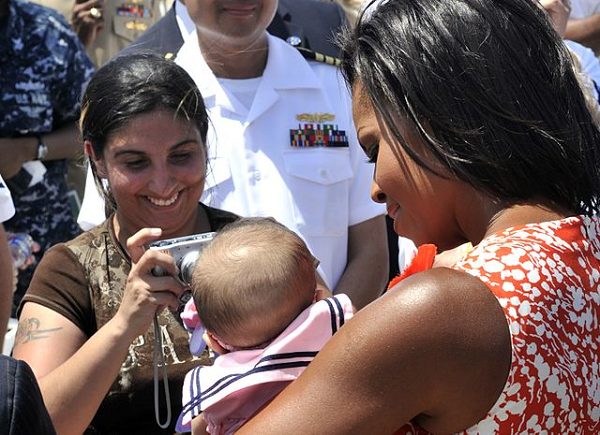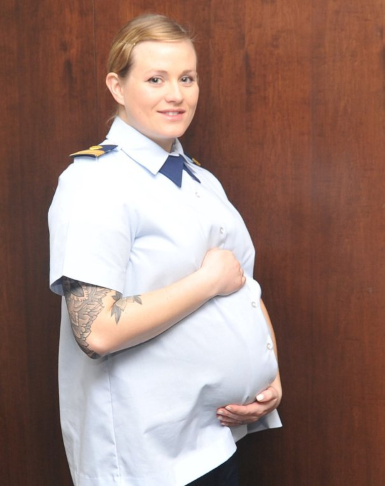It took quite some time before women could serve in the Armed Forces, and when they did, the regulations were clear that pregnancy meant a discharge from military service. These days, you can be pregnant in the military without losing your position.
In 1951, President Truman signed an order making the rule about pregnancy in the military a part of military regulation.
However, it was later shown that assuming a pregnant woman is unfit for service violated the 5th Amendment as it relates to due process.
Although it took until the 1970s before women could be pregnant in the military and not lose their position.
While there is still work to do to ensure fairness, contemporary military practices include supporting families during pregnancy and ensuring parents feel supported as they transition into family units.
The military understands that having strong families translates into well-rounded armed forces.
Related Article – Dating A Marine: 10 Pros And Cons
Table of Contents
Pregnant in the Military: Pregnancy Policies for Each Military Branch

The 2017 National Defense Authorization Act defines the paid leave for parents.
However, each military branch has its own set of regulations that go above and beyond the Department of Defense’s minimum standard.
These rules and regulations cover maternity and paternity leave and how a new birth parent can transition back to work post-partum.
Army Pregnancy Policy Regulations
Active Duty or in the National Guard but on Federal Active Duty will receive maternity care, prenatal care, and newborn care through TRICARE.
The Army considers a birth event to be both giving birth and adoption.
Also, when becoming a new parent, the birthparent receives 12 weeks of leave for those on Active Duty.
If you are National Guard or Reserves for an entire year, you are eligible for the Military Parental Leave Program only if you are active-duty.
Furthermore, the Military Parental Leave Program applies to both parents rather than just the birthparent.
While there is still access to maternity leave in the Guard and Reserves, those who serve the Army part-time lose pay and points towards retirement. This could also negatively impact the ability to receive promotions.
However, lawmakers push to change how the National Guard and Reserves handle maternity leave, points, and retirement.
Navy Pregnancy Policy Regulations

The Navy recognizes that parenthood is a natural event and is compatible with military life.
A service member must notify their commanding officer as soon as pregnancy is confirmed.
Pregnant service members in the Navy may be at sea on a ship until their 20th week.
Also, pregnant service members will not deploy from when the commanding officer learns of the pregnancy until 12 months after.
The Navy considers covered service members to be anyone on active duty and in the reserve component who perform active duties or mobilize for more than 12 months in a row.
Birthparents have six weeks of leave after giving birth, which is considered Maternity Convalescent Leave.
Also, the primary caregiver has another six weeks of leave after the convalescent leave. The primary caregiver is usually the birthparent.
Next, the secondary caregiver, who is not the birthparent, receives two weeks of leave.
Air Force Pregnancy Policy Regulations
The Air Force has a maternity convalescent leave for six weeks followed by the primary caregiver leave of another six weeks.
Also, the secondary caregiver has three weeks of leave.
For those in the reserve component of the Air Force, there are slightly different rules and expectations.
Members can continue regular military duties while pregnant if they are medically able to do so.
However, once convalescent leave begins once the baby is born or before, if medically necessary.
Like other branches of the military, there are six weeks of convalescent leave and another six weeks of primary caregiver leave.
Also, secondary caregivers receive three weeks of leave.
Marine Corps Pregnancy Policy Regulations
Like the other military branches, the Marines grant a six-week convalescent leave and a six-week primary caregiver leave for those pregnant in the military.
Also, the secondary caregiver leave receives two weeks of leave.
The Marine can defer their duty training for 42 days for service members attached to a Marine Reserve unit.
However, the Marine Reservist’s health comes first, and the 42 days may be extended.
Those who have at least 12 continuous months of involuntary active duty are eligible for the convalescent, primary caregiver, and secondary caregiver leave. Those who are ineligible cannot defer their active duty.
Related Article – How To Make A Long-Distance Military Relationship Work
Military Pregnancy Discharge Process

Before thinking about being pregnant in the military and a discharge, you must first understand the difference between a military discharge and separation.
A discharge means a veteran is no longer obligated to fulfill their military service contract.
On the other hand, a separation means the unfulfilled service obligation continues in the Individual Ready Reserves.
In the past, pregnancy is a reason for a discharge, but the rules have changed recently.
However, it is not simple or easy to obtain this type of discharge today because pregnancy does not disqualify service.
Single parents in the military could be discharged if there is no approved Family Care Plan or the plan is impossible to follow.
If the service member cannot fulfill the military obligations and provide for a child, but the service member did all they could to maintain the care plan, they would receive, most likely, an honorable discharge.
For the most part, servicemembers may argue hardship due to pregnancy and leave the service, but this would indicate extenuating circumstances.
Also, depending on the character of the discharge, there may be an impact on veteran status and available benefits.
However, currently, all military branches work with service members to address pregnancy bias and lack of meaningful support for families.
The current goal is to continue to invest in the worth and talent of servicemembers whether they chose to have families or not.
Conclusion
Since pregnancy is considered compatible with a military career, the Department and Defense and the military branches work to ensure families and birth parents have support.
In the past, pregnancy barred women from continuing military service.
However, families today find being pregnant in the military not as disruptive as before.
Until recently, birthparents could separate from the military because of their pregnancy.
However, the Department of Defense ordered a minimum standard for convalescent care and primary and secondary caregiver leave.
From there, each military branch can expand beyond those minimum expectations.
References:
See Also
Here’s What Happens After Navy Boot Camp
General Discharge: 10 Things You (probably) Didn’t Know
Here’s What Happens After Air Force Basic Training
What To Bring To Air Force Boot Camp
- Ikon Pass Military Discount: Learn How To Save Big - January 31, 2025
- RTIC Military Discount: Find Out How To Save Big on Gear - January 30, 2025
- Traeger Military Discount: Learn How To Save Big on Smokers - January 28, 2025

